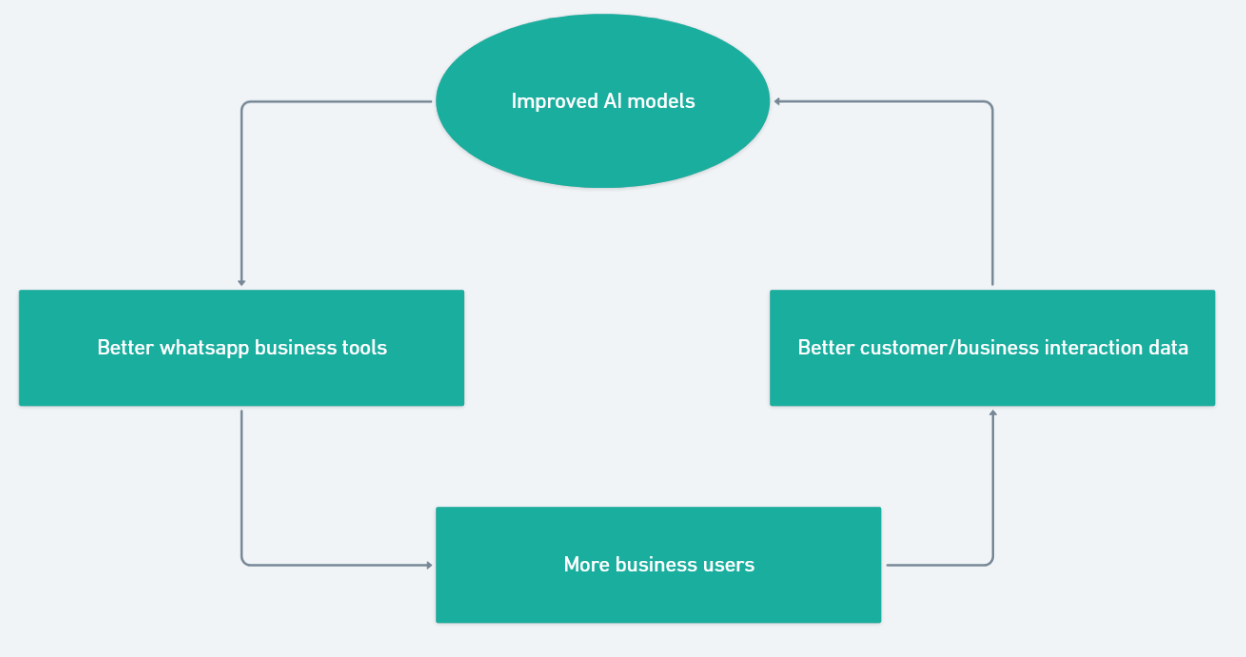Llama says WhatsApp - voluntary lock-in
WhatsApp is shaping up to to be an AI-powered biz platform unlike anything we've seen
My WhatsApp is a mess, and I have a theory about why. I'm kinda particular about a zero inbox, and about
keeping spam off my WhatsApp home. As a result, my user experience everyday has those short but irritating
moments where I have to block yet another business sending unrequited feedback requests or irrelevant
advertisements. No, Acme, I don't want your Diwali offers now. Go ask Wile E. The last time
I wrote about WhatsApp, I focused on how Doctorow's enshittification framework explains the degradation in customer UX.
More businesses using WhatsApp for messaging customers → more spam → worse experience - the usual spiral of
platforms optimizing for revenue over user experience. But there's something more interesting happening
underneath the burgeoning spam. It was quite fun trying to unpack Meta's strategy.
All your platforms are belong to us
Meta's relationship with platforms reads like a cautionary tale in tech strategy. Facebook apps? That was supposed to be the platform that would eat the internet. Then mobile happened. Suddenly Facebook was living in Apple and Google's world (still is), paying their app store taxes, following their privacy rules, watching their ad business get kneecapped by App Tracking Transparency. The pattern keeps repeating. Meta revenue drops when Apple lets users block tracking. Facebook's ad targeting suffers when Google tweaks Android permissions. Every time Meta tries to build their own platform, they end up having to share the loot with someone else.
And still through all this, Meta's figured out one thing incredibly well - how to turn social spaces into shopping destinations. Facebook Marketplace, Instagram Shopping, even attempts at social commerce on WhatsApp - they've proven that people will buy where they already spend their time. TikTok Shop's insane revenues show you the ultimate, distilled form of this playbook. Every time Meta builds a new commerce layer, the revenue numbers are staggering. But they're still playing in someone else's sandbox, which explains why Zuckerberg really wanted the Metaverse to work, why Meta raybans are a thing - you need to own the platform to own the future.

WhatsApp seemed an odd fit here. End-to-end encryption meant not even Meta could read messages. Great for privacy marketing, perfect for user trust, but quite terrible for platform control. You can't build a business ecosystem on messages you can't see. Can't train AI models. Can't improve spam detection. Can't do anything smart with the world's largest messaging dataset because technically, you can't see it. Well, that's not entirely accurate - WhatsApp still has a goldmine of metadata about who messages whom, how often people chat, what times they're most active, and how their social networks interconnect. But that's not enough for what Meta wants to build. Until you realize that's the point.
The Art of Voluntary Lock-in
Here's where Meta's strategy gets deliciously clever. They're not building a platform by force - they're creating conditions where businesses voluntarily give up encryption for capabilities. Need better customer service tools? Want AI to help manage responses? Looking for better analytics? Meta has solutions. Each one comes with clear disclosures about reduced privacy, but when your WhatsApp business inbox is drowning in customer messages, those trade-offs start looking pretty good. The product decisions around 2019 make more sense in this light. WhatsApp Business launches for small businesses. Then the Business API for larger enterprises. Normal for a platform seeking revenue, but look at the privacy policies. Businesses can choose Meta's services to "securely store messages and respond to customers." Sound familiar? It's the same playbook Meta's running with Llama - open source the core, monetize the tooling.

The Two-Way Feed
This is where Llama matters, and not just as another AI play. Meta needs something more than an open-source model
to compete with closed AI giants. They need high-quality training data from real business interactions - the kind that
helps models understand customer service, commerce, and business communication. That's where WhatsApp's business users
come in. When businesses opt into Meta's AI services for WhatsApp, they're not just getting better tools - they're
feeding Meta's models with exactly the kind of data Llama needs.
The flywheel is elegant: WhatsApp business messages train better AI models, better AI models make business messaging more attractive,
more businesses adopt Meta's services, more training data flows in. All while maintaining the appearance of choice and openness. It's the same pattern we saw
with Facebook Pages (organic reach → paid reach) and Instagram Shopping (free listing → paid integration), but executed
with more subtlety. Meta didn't opensource Llama just because they believe in AI democratization
(though that PR certainly helps) - they're building an ecosystem where businesses voluntarily feed their AI ambitions.

The Infrastructure Play
The product roadmap tells the story. WhatsApp Pay expansion builds the transaction layer. Channels normalize non-E2E spaces. Business catalogs lay commerce infrastructure. Each piece seems independent but connects both to Meta's AR future and their AI infrastructure play. They're not building another ad platform - they're creating the substrate for business-customer interaction in the AI era. Think about what businesses get: Access to 2 billion DAU's locked into encrypted personal chats, businesses voluntarily sharing data for better tools, training data for AI models from real business interactions, no platform dependencies or taxes, revenue without breaking encryption promises. Meta doesn't want to own messaging or AI separately - they want to own how businesses and customers interact in the AI era. And they're doing it by making everyone think it was their choice.
The Risks Ahead
Could this fail? Sure. Regulation, especially in India, could force changes to business messaging. Apple or Google could somehow extend their platform control to business messaging. Some combination of Signal + ChatGPT could offer a privacy-focused alternative. But Meta's learned from their previous platform attempts. By making encryption optional rather than breaking it, by opensourcing AI rather than closing it, they maintain optionality while building leverage. The next two years tell us if this works. Meta's rolling out more AI-powered business features. Payment tools are expanding. AR commerce integration is coming. But the real story isn't whether WhatsApp gets better at messaging. It's whether Meta can transform their messaging platform into the default interface for business-customer interaction - one voluntary opt-out at a time.
Like all great platform transitions, users rarely notice until it's done. WhatsApp's evolution from clean messaging app to AI-powered commerce platform won't happen with a bang. It'll happen gradually, one blocked spam message and one business interaction at a time, until one day we realize the messaging app we knew is gone, replaced by something else - but owned by Meta. But hey, at least those Diwali offers might learn to show up at the right time.